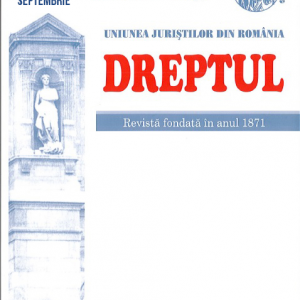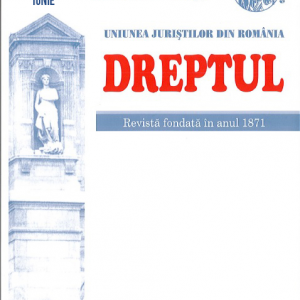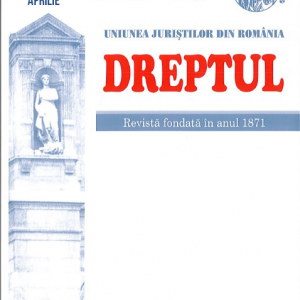-
 This paper aims to address some issues encountered in the control/audit activity that the Romanian Court of Accounts performs on public authorities and institutions, which aims the disputes arising from breaching by them of the provisions of Law no. 544/2001 on free access to public information. The law provides, in art. 22, that the person who considers himself injured in his rights may appeal to the legal administrative department in whose territorial jurisdiction is residing or the authority or public institution is situated, and the court may require the defendant authority to provide the requested information and pay moral and/or property damages. The defendant in this litigation is the territorial administrative unit (village, town, city, county), and the obligation to pay any compensation falls to it.
This paper aims to address some issues encountered in the control/audit activity that the Romanian Court of Accounts performs on public authorities and institutions, which aims the disputes arising from breaching by them of the provisions of Law no. 544/2001 on free access to public information. The law provides, in art. 22, that the person who considers himself injured in his rights may appeal to the legal administrative department in whose territorial jurisdiction is residing or the authority or public institution is situated, and the court may require the defendant authority to provide the requested information and pay moral and/or property damages. The defendant in this litigation is the territorial administrative unit (village, town, city, county), and the obligation to pay any compensation falls to it. -
 In a study published in the “Dreptul” Magazine no. 3/2013, p. 108-115, an author criticized the regulation stated in Art. 519-521 of the new Code of Civil Procedure (entered into force on 15 February 2013) regarding the seizing of the High Court of Cassation and Justice for passing a preliminary ruling for clarifying certain law-related issues, which is why he proposed the repeal of these texts. In response, in this study, the author considers that the regulation in question is useful and therefore should not be repealed.
In a study published in the “Dreptul” Magazine no. 3/2013, p. 108-115, an author criticized the regulation stated in Art. 519-521 of the new Code of Civil Procedure (entered into force on 15 February 2013) regarding the seizing of the High Court of Cassation and Justice for passing a preliminary ruling for clarifying certain law-related issues, which is why he proposed the repeal of these texts. In response, in this study, the author considers that the regulation in question is useful and therefore should not be repealed. -
 The article intends to give an analysis of the constituent elements of the crime of violation of private life, taking into consideration that this incrimination is new for the penal legislation in our country. The emphasis lies especially on the issues regarding the components of the external and mental elements of this crime, together with the presentation – when the author found it necessary – of certain sugesstions for the improvement of the incriminating rule. The actual analysis of the crime comes with certain generic considerations on private life as a social value, reffering to those aspects emerging from the juridsprudence of the European Court of Human Rights.
The article intends to give an analysis of the constituent elements of the crime of violation of private life, taking into consideration that this incrimination is new for the penal legislation in our country. The emphasis lies especially on the issues regarding the components of the external and mental elements of this crime, together with the presentation – when the author found it necessary – of certain sugesstions for the improvement of the incriminating rule. The actual analysis of the crime comes with certain generic considerations on private life as a social value, reffering to those aspects emerging from the juridsprudence of the European Court of Human Rights. -
 Guaranteeing the right to defence is a fundamental principle under the Romanian criminal procedure law. Although it has strong constitutional and criminal procedure guarantees, however, its practical implementation is in some cases misinterpreted and, on the other hand, the prosecution bodies violate it sometimes, the consequence being the discrediting of the judicial process. The present article refers to jurisprudence in two cases where the defender’s right to question the opposing party and to inspect the prosecution file is restricted without legal basis.
Guaranteeing the right to defence is a fundamental principle under the Romanian criminal procedure law. Although it has strong constitutional and criminal procedure guarantees, however, its practical implementation is in some cases misinterpreted and, on the other hand, the prosecution bodies violate it sometimes, the consequence being the discrediting of the judicial process. The present article refers to jurisprudence in two cases where the defender’s right to question the opposing party and to inspect the prosecution file is restricted without legal basis. -
 Considering the importance that information technology has acquired in recent years and how it has come to influence the criminal policy at the international level, the author of this study founds it necessary to analyse the subject matter of the offence taking into account this new technological context. Thus, it has been attempted to highlight the need for a reconceptualization of the offence’s subject matter, emphasizing the idea according to which intangible elements may be part of its structure. In support of this thesis, there was reviewed the problem of theft of virtual goods and of certain cybercrimes that reveal the existence of an intangible subject matter which is likely to be interposed between the agent’s behaviour and the social value protected by the rule of incrimination. Last but not least, the author has pointed out a possible consequence of the reconceptualization of the subject matter of the offence, referring thus to the applicability of the supporting cause of self-defence.
Considering the importance that information technology has acquired in recent years and how it has come to influence the criminal policy at the international level, the author of this study founds it necessary to analyse the subject matter of the offence taking into account this new technological context. Thus, it has been attempted to highlight the need for a reconceptualization of the offence’s subject matter, emphasizing the idea according to which intangible elements may be part of its structure. In support of this thesis, there was reviewed the problem of theft of virtual goods and of certain cybercrimes that reveal the existence of an intangible subject matter which is likely to be interposed between the agent’s behaviour and the social value protected by the rule of incrimination. Last but not least, the author has pointed out a possible consequence of the reconceptualization of the subject matter of the offence, referring thus to the applicability of the supporting cause of self-defence. -
 The author, comparatively examining the provisions set forth under Articles 1402-1404 of the former Civil Code (1864), Article 45 of the former Commercial Code (from 1887), both currently repealed, with those set forth under Article 124 of Law No. 71/2011 relating to the implementation of the new Civil Code, concludes that, despite an explicit intervention, under the rule of the new Civil Code (Law No. 287/2009) disputed revocation is forbidden at present for all contentious rights, irrespective of their nature. Currently, disputed revocation is allowed only for assignment of rights concluded prior to October 1st, 2011 (when the new Civil Code was enacted)
The author, comparatively examining the provisions set forth under Articles 1402-1404 of the former Civil Code (1864), Article 45 of the former Commercial Code (from 1887), both currently repealed, with those set forth under Article 124 of Law No. 71/2011 relating to the implementation of the new Civil Code, concludes that, despite an explicit intervention, under the rule of the new Civil Code (Law No. 287/2009) disputed revocation is forbidden at present for all contentious rights, irrespective of their nature. Currently, disputed revocation is allowed only for assignment of rights concluded prior to October 1st, 2011 (when the new Civil Code was enacted) -
 The purpose of this article is to assess the crime of violation of the secret of correspondence from the perspective of the New Penal Code of Romania. While taking into consideration the guidelines emerging from the jurisprudence of the European Court of Human Rights, the author separately analyses the constituent elements of this crime, emphasizing on certain issues generated by the case records of the Romanian courts of law. De lege ferenda proposals are also advanced for the purpose of emendating the system of penal protection of a person’s right to freedom of communication.
The purpose of this article is to assess the crime of violation of the secret of correspondence from the perspective of the New Penal Code of Romania. While taking into consideration the guidelines emerging from the jurisprudence of the European Court of Human Rights, the author separately analyses the constituent elements of this crime, emphasizing on certain issues generated by the case records of the Romanian courts of law. De lege ferenda proposals are also advanced for the purpose of emendating the system of penal protection of a person’s right to freedom of communication. -
 In this study, the author presents first the main reasons that led to the development of the 2009 Criminal Code and the objectives pursued by its wording. Subsequently, the author presents the main novelties brought by the regulations contained in the General Part and the Special Part of the new Criminal Code. Presentation of the characteristic features and innovations introduced by the 2009 Criminal Code compared to the Criminal Code of 1969 is achieved whilst revealing both the merits and some shortcomings of the new criminal law. These explanations are accompanied by numerous examples, own ideas and suggestions to improve the texts analyzed. In a final section, the author presents, in a reasoned manner, his own conclusions drawn in relation to the study of the new Criminal Code.
In this study, the author presents first the main reasons that led to the development of the 2009 Criminal Code and the objectives pursued by its wording. Subsequently, the author presents the main novelties brought by the regulations contained in the General Part and the Special Part of the new Criminal Code. Presentation of the characteristic features and innovations introduced by the 2009 Criminal Code compared to the Criminal Code of 1969 is achieved whilst revealing both the merits and some shortcomings of the new criminal law. These explanations are accompanied by numerous examples, own ideas and suggestions to improve the texts analyzed. In a final section, the author presents, in a reasoned manner, his own conclusions drawn in relation to the study of the new Criminal Code. -
 Under art. 164 to 177 of the Civil Code the legislator regulates “the protection of the judicial prohibited” and “the placing under judicial interdiction procedure” under art. 935 to 940 of the Code of Civil Procedure; these texts essentially take over the old regulation provisions and also establish some updates, including that of determining jurisdiction in the matter in favor of the court guardianship, court which also takes over the guardianship authority duties. This study aims to explore and explain the legal rules above.
Under art. 164 to 177 of the Civil Code the legislator regulates “the protection of the judicial prohibited” and “the placing under judicial interdiction procedure” under art. 935 to 940 of the Code of Civil Procedure; these texts essentially take over the old regulation provisions and also establish some updates, including that of determining jurisdiction in the matter in favor of the court guardianship, court which also takes over the guardianship authority duties. This study aims to explore and explain the legal rules above. -
 According to art. 147. (4) of the Constitution, the Constitutional Court rulings are generally binding. Therefore, the public authorities, including courts, regardless of their level, must observe the Constitutional Court rulings both in terms of the operative part and recitals thereof. Although they do not constitute a source of law, the High Court of Cassation and Justice judgments rendered after settlement of an appeal in the interest of law, require the courts a particular solution to a law issue, therefore an interpretation of legal rules. When performing the interpretation and application of law, a contingent conventionality control also occurs; such control is carrying out by this Court whilst assuming that the courts’ divergent practice is given by the different application of the (European) Convention on human rights and fundamental freedoms provisions. Not infrequently, the High Court of Cassation and Justice’s jurisprudence on the matters submitted to trial did not coincide with that of the Constitutional Court, and this study aims to point out and analyze such cases. The proposed solution takes into account a possible constitutionality review of the previously reported judgments of the High Court of Cassation and Justice; such control has already been carried out indirectly in certain rulings of the Constitutional Court.
According to art. 147. (4) of the Constitution, the Constitutional Court rulings are generally binding. Therefore, the public authorities, including courts, regardless of their level, must observe the Constitutional Court rulings both in terms of the operative part and recitals thereof. Although they do not constitute a source of law, the High Court of Cassation and Justice judgments rendered after settlement of an appeal in the interest of law, require the courts a particular solution to a law issue, therefore an interpretation of legal rules. When performing the interpretation and application of law, a contingent conventionality control also occurs; such control is carrying out by this Court whilst assuming that the courts’ divergent practice is given by the different application of the (European) Convention on human rights and fundamental freedoms provisions. Not infrequently, the High Court of Cassation and Justice’s jurisprudence on the matters submitted to trial did not coincide with that of the Constitutional Court, and this study aims to point out and analyze such cases. The proposed solution takes into account a possible constitutionality review of the previously reported judgments of the High Court of Cassation and Justice; such control has already been carried out indirectly in certain rulings of the Constitutional Court. -
 The author analyzes the condition of existence of common property for granting legal personality to an owners’ association in the light of the provisions included in the Law No 230/2007, starting from a solution of the judicial practice, reaching to the conclusion that the establishment of an association can not take place unless there is a common property of all members of the association.
The author analyzes the condition of existence of common property for granting legal personality to an owners’ association in the light of the provisions included in the Law No 230/2007, starting from a solution of the judicial practice, reaching to the conclusion that the establishment of an association can not take place unless there is a common property of all members of the association. -
 The practice of the constitutional jurisdiction court points out that the exercise of the constitutionality control does not lead only to the ruling of some simple solutions, by which the criticized text or texts of the law are found to be or not in compliance with the rules of the Fundamental Law. The complexity of this control, in close connection with the growing complexity of the regulations, but also with the desideratum of legal security, which must be equally considered in exercising the constitutionality control, makes that the solutions of the Constitutional Court be also expressed in different forms. This study makes an analysis of the decisions of the Constitutional Court pertaining to the category circumstantiated by the term „interpretative decisions”, in order to emphasize their importance and their role in the process of constitutionalization of law. Certainly, the achievement of constitutionality control involves, in itself, a process of interpretation and comparison of the constitutional rules and, respectively, of the infraconstitutional ones. Within the interpretative decisions, however, this comparative examination has a greater complexity, constituting an emphasis of more possible interpretations and the identification of the one which complies with the provisions of the Constitution. Such an analysis also raises for discussion the role of the Constitutional Court in the process of interpretation of the legal infraconstitutional rules, an interpretation facilitated by the provisions of the Fundamental Law, its basis and the limits of the jurisdiction of the Court.
The practice of the constitutional jurisdiction court points out that the exercise of the constitutionality control does not lead only to the ruling of some simple solutions, by which the criticized text or texts of the law are found to be or not in compliance with the rules of the Fundamental Law. The complexity of this control, in close connection with the growing complexity of the regulations, but also with the desideratum of legal security, which must be equally considered in exercising the constitutionality control, makes that the solutions of the Constitutional Court be also expressed in different forms. This study makes an analysis of the decisions of the Constitutional Court pertaining to the category circumstantiated by the term „interpretative decisions”, in order to emphasize their importance and their role in the process of constitutionalization of law. Certainly, the achievement of constitutionality control involves, in itself, a process of interpretation and comparison of the constitutional rules and, respectively, of the infraconstitutional ones. Within the interpretative decisions, however, this comparative examination has a greater complexity, constituting an emphasis of more possible interpretations and the identification of the one which complies with the provisions of the Constitution. Such an analysis also raises for discussion the role of the Constitutional Court in the process of interpretation of the legal infraconstitutional rules, an interpretation facilitated by the provisions of the Fundamental Law, its basis and the limits of the jurisdiction of the Court.
